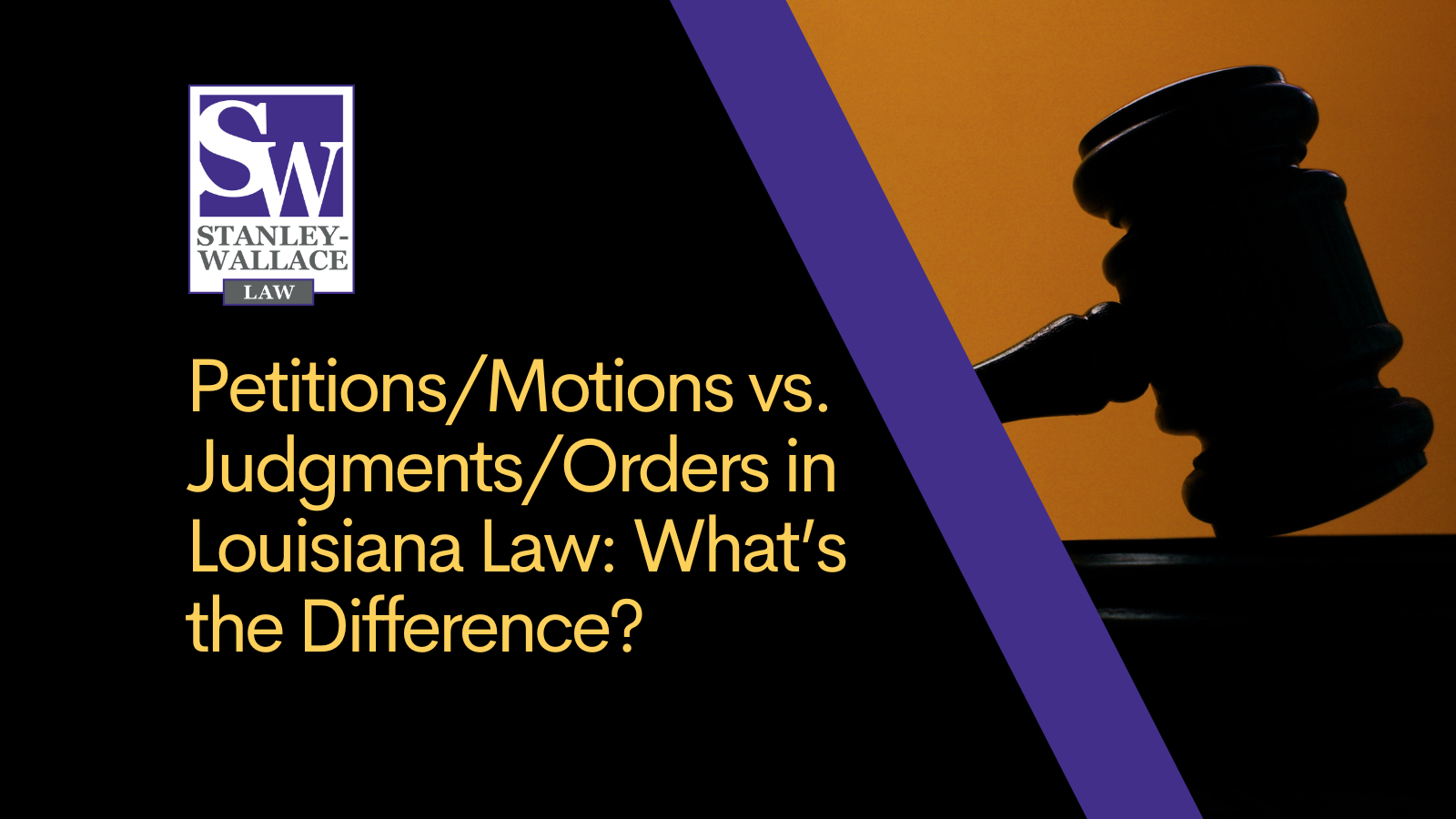If you’ve ever been involved in a legal matter in Louisiana—or even just watched a courtroom drama—you’ve probably heard the terms petition, motion, order and judgment. While they’re all critical parts of the legal process, they serve very different purposes. Let’s break it down using Louisiana law to explain how they differ.
What Is a Petition/Motion?
In simple terms, a motion is a request. It’s a formal application made to the court by one of the parties in a lawsuit, asking the judge to make a ruling or take some action before or during the trial. A petition is a request by the plaintiff or petitioner that begins the suit.
Under Louisiana Code of Civil Procedure, a motion can come in many forms. Some common types include:
- Motion to Dismiss: Asking the court to throw out the case.
- Motion for Summary Judgment: Asking the court to rule in your favor without a trial because there are no material facts in dispute.
- Motion to Compel: Asking the court to force the other side to produce documents or respond to discovery.
- Motion for Continuance: Requesting to delay a scheduled court date.
- Petition for Divorce – A pleading filed by the plaintiff/petitioner initiating the divorce proceedings.
- Petition for Damages – A pleading filed by the plaintiff asking the court for money damages due to a personal injury or property damage.
Petitions begin legal proceedings and motions are tools that help move the case along. They are requests by a litigant. A judge rules on a motion, but that ruling is not the final decision in the case—unless it results in dismissal or summary judgment. While reading a petition or a motion can be daunting, it is important to remember, that it is just a request and not a final decision by the court.
What Is a Judgment/Order?
A judgment is the court’s official decision on the outcome of the case. It’s typically issued after a trial, or after the court has granted a dispositive motion like a motion for summary judgment. Louisiana Code of Civil Procedure Article 1841 defines a “judgment” as “the determination of the rights of the parties in an action.” This could involve awarding money damages, granting custody, issuing an injunction, or declaring rights or responsibilities.
Types of judgments include:
- Final Judgment: Resolves all issues in the case and ends the litigation.
- Partial Final Judgment: Resolves only part of the dispute, with the rest of the case still ongoing.
- Default Judgment: Issued when one party fails to respond or appear in court.
- Consent Judgment: Based on an agreement between the parties, approved by the court.
A judgment is enforceable—meaning the winning party can use it to collect money, compel action, or seek further relief.
An order is also issued by a judge, but it typically involves procedural or interim matters rather than the final outcome of the case.
Orders can be issued at any time during a lawsuit—before, during, or after trial. Some orders simply instruct the parties on how the case will proceed, while others may grant or deny specific motions.
Both judgments and orders are signed by the judge and are legal determinations made by the court and enforceable.
Key Differences at a Glance
Feature Motion/Petition Judgment/Order
What it is A request made to the court A formal ruling by the court
Purpose To ask the court to take action To resolve the legal dispute
Why It Matters
Understanding the difference between a motion/pleading and a judgment/order helps you follow the legal process and know what to expect at each stage. If you’re involved in a lawsuit, your attorney may file several motions before ever getting to a judgment. Each one plays a role in shaping how—and sometimes whether—the case goes to trial. It is particularly important to understand that while you or the other side may ask for something in a motion or petition, it is not enforceable or resolved until a judgment or order is issued by the court and signed by a judge. It is only then that the specific issue contained in the judgment or order has been resolved.
In Louisiana, as in other states, the legal system has its own language. Knowing these terms can help you feel more confident and informed if you’re ever in a courtroom—or even just reading legal documents.
Need Legal Help in Louisiana? If you’re facing a legal issue and not sure what steps come next, consider consulting with a Louisiana-licensed attorney. The legal process can be complex, but with the right guidance, you don’t have to face it alone.


